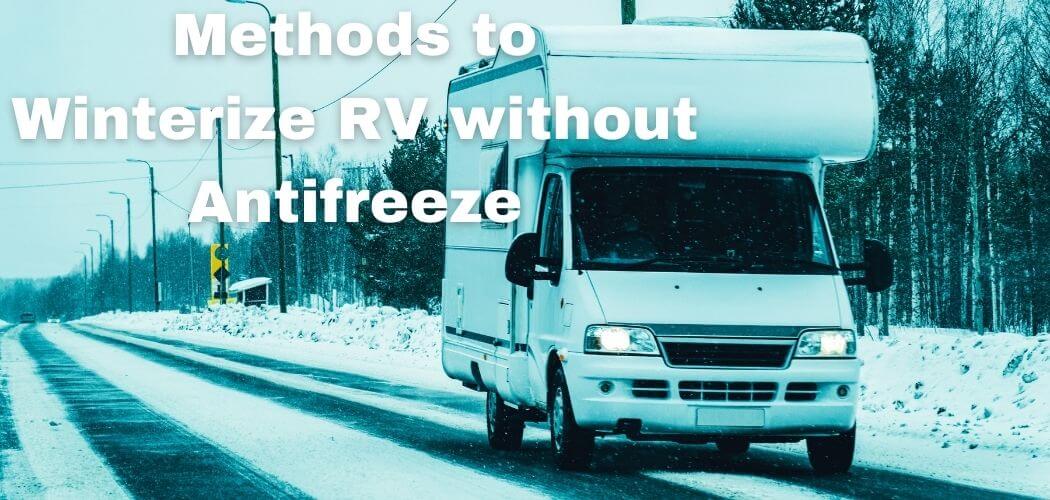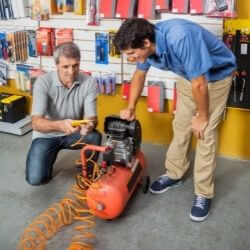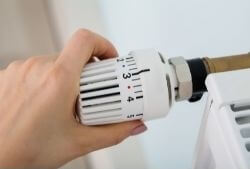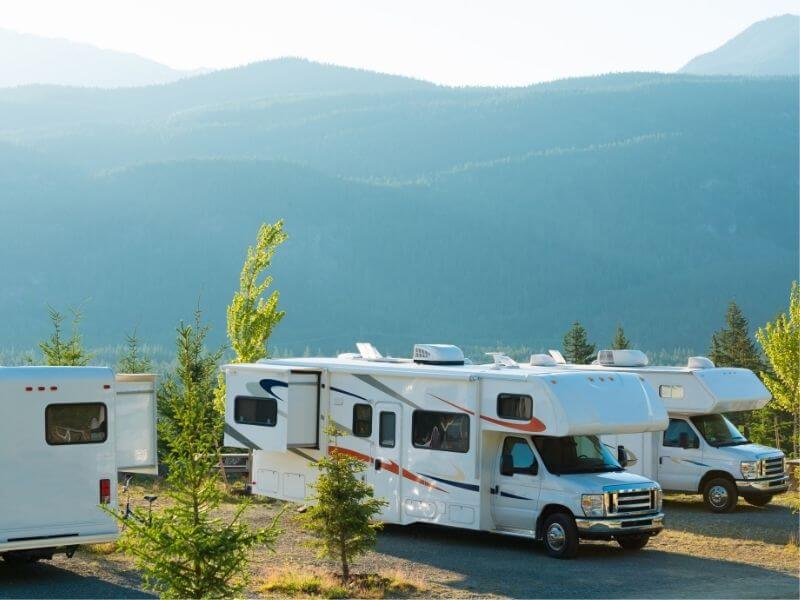After a cold winter, I knew that a lot of people had problems with antifreeze getting into their freshwater supply and ruining it for drinking or washing hands or dishes, etc.
I realized there must be some simple way to prevent this from happening without adding the poisonous chemicals into one’s freshwater supply while at the same time not eliminating any of the freezing protection.
After much research and experimentation, I came up with a simple process which works very well for me and my family every time when we winterize our 5th wheel trailer.
[su_note]Related Article: Best Generator For Mobile Home[/su_note]
5 Best Methods to Winterize RV without Antifreeze
If you are already using a method that keeps all of your fresh water parts from freezing during cold weather (i.e. heat tape, thermostatically controlled valves/heaters or solar panel pumping), then you can eliminate any need for adding antifreeze at all.
1) Attaching a Air Compressor
Attaching the Air Compressor to your Water Lines also help for rv winterizing. It will definitely help to keep your pipes from freezing. The one I use, even though it is a small 12-volt air compressor, I can still pump water through my house’s drain lines in order to keep the rest of our plumbing lines ice free.
I have been using this air compressor for years and it has worked well for me and keeps us going until spring when we can hook up our larger hydraulic hose to it.
Steps to attach your portable air compressor to RV water lines:
- Turn off your water supply to the air compressor at the source and drain your hose.
- Attach your pressure regulator to the port on your air compressor that is opposite of where you normally would hook up a regular garden hose to it. The reason being, when the output from an air compressor is attached directly into a water line, even with a pressure regulator (in this case RV Pressure Regulator) hooked up to regulate the flow, there can still be too much pressure for household appliances such as a dishwasher or washing machine to work properly. I am simply trying not to pressurize my system.
- Hook up your quick-release
- Hook up the female threaded quick connect to your air hose and funnel.
- Attach the male threaded quick connect to your water line. The female valve on each end can be opened and closed by hand. The method I have found is simply opening them and allowing them to close by themselves, if you do not have a male quick connect that will shut this way such as mine below then manually open/close it until you get used to it.
- Turn your water supply back on into your air compressor by turning on the faucet at its source or activating the pump inside of it from a switch. This should start pressurizing your lines soon enough.
- Watch for leaks! You may need some te valve if you have one by attaching it inline between the air pressure regulator and drain valve.
2) Heat Tape Helps to Winterize RV
Heat Tape is a way through which you will winterize rv without antifreeze. Heat Tape is long and rolls up, it can be easily cut to size. It is a wire with resistance in it. When you break the skin of your rv you just put this heat tape under it on the inside.
As far as the tape goes, you would have 12 volts DC applied through an external thermostat to maintain its temperature.
You don’t want to start your engine but use this device only after starting and then keep it running till the water turn warm or hot enough so that no need of further heating.
Heat tape is easy to install, but might be expensive as compared to other methods. You need to insulate the water lines and then wrap them around with heat tape. However, this method requires running a pump 24/7 which costs extra amount of electricity in winter season.
Also Read: Does RV Antifreeze Evaporate?
3) Thermostatically Controlled Valves
Thermostatically controlled valves also use for winterizing rv without antifreeze. For that purpose your water is split into two parts. The fresh water and the waste.
The fresh water lines are kept full of antifreeze, while the waste lines are drained. You will have a valve on each side with a gasket that separates them (they don’t sit directly against each other).
This allows you to turn the valves on or off depending on which side you want to use at any given time. However, most people choose to remove both and set them in a safe place where they won’t be disturbed.
As long as your tank has not frozen over completely, there should be no problem with this method of winterizing RV without antifreeze.
Related Article: Mobile Home Winterization Checklist
4) Use Heating System for RV Winterizing
In another way of Winterizing RV without antifreeze is by following these steps:
- Use a space heater in conjunction with your propane furnace or hot air wall vent.
- Turn both on for a few minutes every hour that the water is running. If you are using it alongside your furnace, turn off the propane and let the space heater do its job at first.
- Then set the thermostat to about 50 degrees F and leave it there until spring arrives. The thermostat will shut down the furnace before your pipes freeze even if your water is still cold.
Boil Water: This method of winterizing RV without antifreeze is more risky than any other methods as far as I know. If you want to use this method then there are three suggestions to keep in mind :
- Use a stovetop or electric kettle which can keep water hot for extended periods of time. If the kettle is used, only fill it with as much water at once that can be cooled down before freezing begins. This will prevent the formation of a layer of ice on top which could break and spill boiling hot water inside your RV.
- Keep the container outside so that heat from the sun keeps it warm longer into the night when temperatures drop. You can also use one or two small space heaters to keep things even warmer.
- Don’t let recently boiled water sit too long inside your rig if you’re not going to use it at once. Add a couple drops of non-toxic antifreeze to each pot before putting on stovetop or in kettles.
5) Solar Panel Pump
In some cases solar panel pump helps in winterizing rv without antifreeze. There will be no more electricity outages, or generator noise, damage to the pump due to freezing in the open air outside your rig while you sleep.
[su_note]Also Read: Best Window Air Conditioner for Mobile Homes[/su_note]
How to Winterize RV Through Fresh Water Tank?
One of the most important steps is to remove all water from your freshwater tank. You can use a garden hose to drain out the water, but it may be difficult if you have an RV with a low-hanging roof. The easiest way to get rid of the excess liquid is by running it through your black and grey tanks first. In this article, we will show you how easy winterizing RVs can be!
The first step of winterizing an RV is to disconnect your hoses and drain any leftover water from the freshwater tank. You can do this by simply opening the faucet for a short period of time, or you can completely disconnect one end of your hose and run it through to drain out all residual liquid.
After you’ve detangled your hoses, go ahead and open the black tank vent cap to get rid of all remaining moisture in the system.
This will ensure that your waste tanks are clear before they’re stored away for the season. Now all that’s left is to make sure you have enough water in your fresh tank for emergencies.
Also Read: How To Keep A Mobile Home Warm During Winter?
Conclusion:
Antifreeze is a popular additive to winterize RV tanks, but it can be dangerous. Our experts recommend these 5 best alternative ways to winterize your tank and keep the inside of your RV warm this winter!
What do you use in your RVs? Let us know below!




